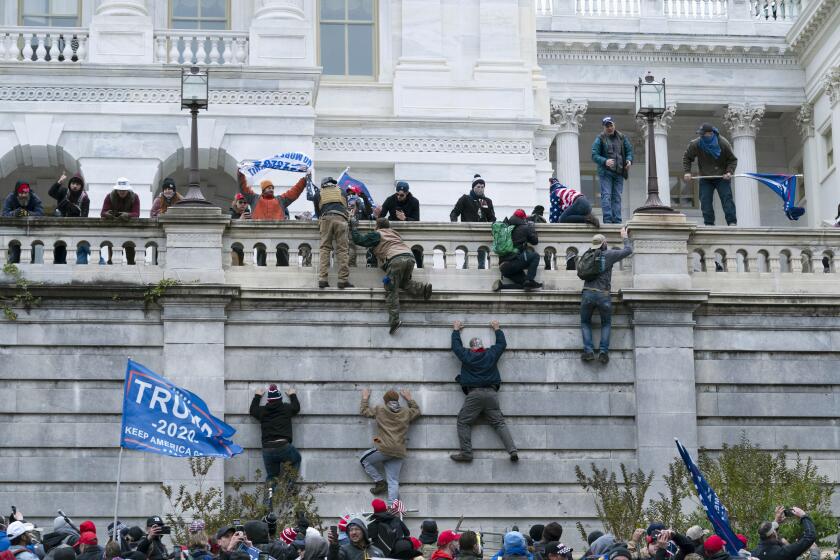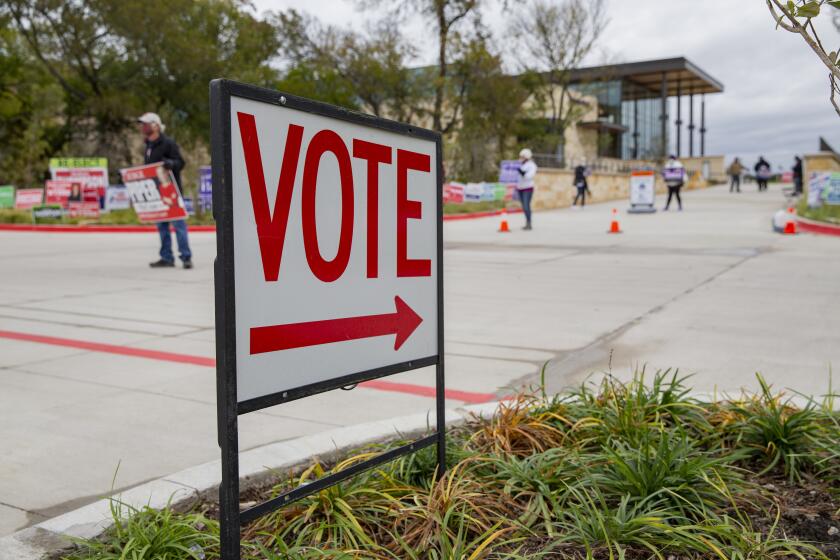Opinion: Voting in America is still secure. But a dark anti-election movement seeks to change that

- Share via
Every year, Americans of every political stripe volunteer their time to register voters on the street, knock on doors for political campaigns and assist voters with disabilities or limited English proficiency. They welcome new voters into the electorate and equip them to participate. As our democracy faces unprecedented challenges, it is thanks to them, and to the thousands of public servants who run our elections, that we can all be confident the vast majority of voters will cast a ballot smoothly and safely this year.
Yet some volunteers, suspicious of our elections, are trying to turn democracy in on itself. They are working to keep voters away from the polls and to root out fraud — even though every legitimate study shows voter fraud to be vanishingly rare.
This growing antidemocratic brand of activism is a dark mirror image of the grassroots work that drives our democracy. Many of the participants seem motivated by a real sense of civic duty. That’s because leaders of the election denial movement cynically use disinformation to twist Americans’ democratic impulses toward antidemocratic ends, and to lay the groundwork to challenge election results baselessly.
For the first time since the end of Jim Crow, substantial numbers of Americans are considering fleeing jurisdictions where legalized vigilantism imperils their lives.
Four years ago, then-President Trump’s attempt to overturn the presidential election was carried out mostly by a small group of insiders — a cast of characters whose desperate antics would be laughable if their goal wasn’t so serious, including lawyers Rudolph W. Giuliani and John Eastman and the MyPillow Chief Executive Mike Lindell, who has helped finance the election denial movement. That plot culminated in the Jan. 6, 2021, insurrection by hundreds of followers, many of whom appeared to believe they were carrying out some patriotic duty by attacking the U.S. Capitol and interfering in our nation’s most sacred tradition, the peaceful transfer of power.
In the years since, Trump’s ragtag gang of election deniers has built a movement, organizing everyday American citizens to take democracy down. Cleta Mitchell — one of the lawyers on the January 2021 call in which Trump pressured the Georgia secretary of state to revise the vote in his favor — has assembled the Election Integrity Network, which has some 30 state chapters and weekly Zoom calls. This year Mitchell created the Only Citizens Vote coalition, which she has likened to a “national neighborhood watch” over elections. Mitchell’s network was initially backed by the Conservative Partnership Institute, where former White House Chief of Staff Mark Meadows is a senior partner and which has reportedly contributed to an online system to enable mass challenges of voters. Stephen K. Bannon, a close ally of Trump, uses his radio show to encourage those who don’t believe in elections to sign up to be poll watchers, part of efforts to start “taking over all the elections.”
In this twisted inversion of a healthy, functioning democracy, these activists harass volunteers registering Latino voters with discriminatory accusations that they are signing up noncitizens to vote. Some have joined right-wing groups that challenge their neighbors’ right to vote based on dubious “investigations,” or conduct canvassing to scrutinize voter rolls. In Pennsylvania, volunteer activists sent mailers encouraging voters suspected of moving to cancel their voter registration, confusing and alarming recipients.
Although these activists often insist they are helping officials ensure fair voting, they are effectively doing the opposite — intimidating voters and interfering in elections. Rather than stop actual fraud, these efforts are far more likely to scare eligible voters away from voting or remove them from the rolls based on faulty data. The targeting of Latino registration drives, and the focus of some activists on scrutinizing voters with “Hispanic-sounding last names,” are reminders that disenfranchisement is especially likely for voters of color. Moreover, an unprecedented surge of Americans hear this call to antidemocratic vigilantism as an invitation to harass and threaten election officials.
New research indicates that anyone, regardless of party affiliation, can easily fall victim to misinformation when it aligns with their political views.
There are robust legal safeguards to prevent these tactics from undermining our elections. Many federal and state laws prohibit the intimidation of voters, election workers and volunteers registering and turning out voters, as our team at the Brennan Center has shared in resources available to election officials, pro-democracy organizations, law enforcement and anyone else. Although poll watchers play an important role in protecting the transparency of elections, there are rules governing their role — for example, they cannot physically threaten voters or ask intrusive questions. Those who break the rules can be removed from the polls.
State laws put limits on voter challenges, including, for example, Arizona’s requirement that a challenger provide “clear and convincing evidence” of a voter’s ineligibility in order to prevail. Election denialism has helped erode some legal protections; in Georgia, the state Legislature passed a pair of laws that allowed voters to file an unlimited number of challenges and lowered the bar for bringing them. But responsible local election officials have ensured that few of those challenges resulted in voters being removed from the rolls.
There is also a powerful counter-alliance fighting to keep our democracy right side up. This fall, some states have seen record-breaking voter registration numbers, early voting turnout and creative community efforts, including by marching bands and celebrities, to get people to the polls. More than 300 organizations are part of the national, nonpartisan coalition Election Protection, which offers national hotlines in multiple languages to answer how-to-vote questions (at [866] OUR-VOTE [687-8683] for English speakers). Its volunteers and staff, including lawyers, can help elevate more serious issues to officials if necessary.
Voters themselves, of course, are key to defending democracy this fall — by exercising their right to vote. In future elections, those interested can join a registration drive, knock on doors to encourage voting, sign up to be a poll worker and support your local election officials. And you can always let your representatives in Congress know that you value an inclusive, representative democracy. Building that system up, not tearing it down, is the future we deserve.
Sean Morales-Doyle is the director of the voting rights program at the Brennan Center for Justice at NYU Law.
More to Read
A cure for the common opinion
Get thought-provoking perspectives with our weekly newsletter.
You may occasionally receive promotional content from the Los Angeles Times.












